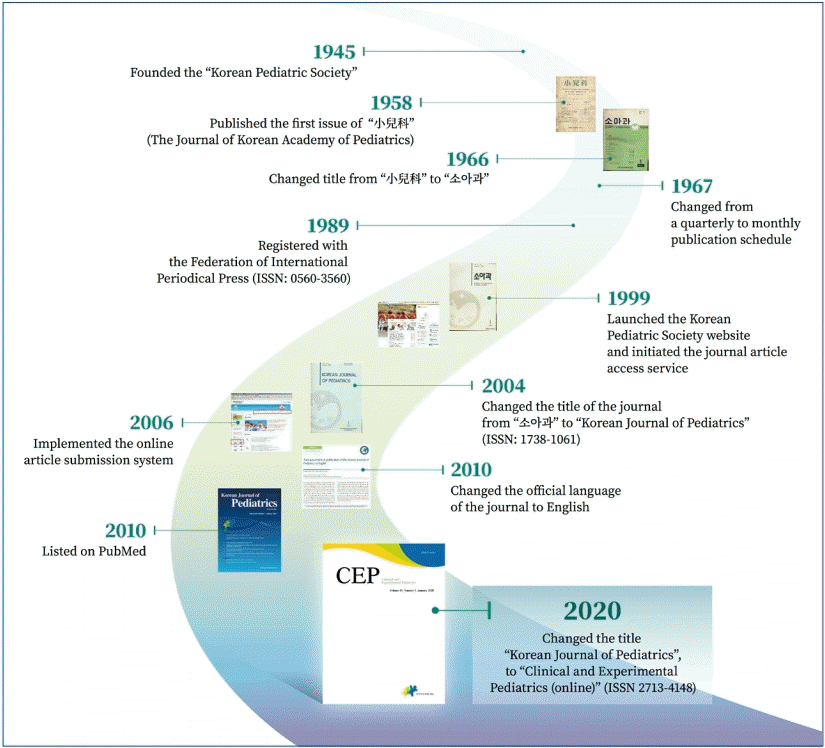The long journey toward improving children’s health: from ‘Korean Journal of Pediatrics’ to ‘Clinical and Experimental Pediatrics’
Article information
The chance for pediatricians, researchers, and policy makers to work in pediatric health is a privilege and an obligation. To support this opportunity, the senior pediatricians launched an academic journal, set goals to meet the diverse needs of authors and readers, and developed relevant strategies.
The long journey of the journal of the Korean Pediatric Society began in 1958, when it was first published as “SoAKwa” (The Journal of Korean Academy of Pediatrics). This publication was launched much later than the founding of the academy because of the national war, as reported by Sun-Keun Lee (then President of the Korean Pediatric Society) in his congratulatory address honoring the publication of the first issue. Despite the belated publication of the journal, academic activities were carried out successfully during the preparation period. Later, the Korean Pediatric Society made various attempts to meet the contemporary needs of specialists in clinical pediatrics (Fig. 1).
Throughout the past 60 years, the journal has changed to meet the needs of readers and, during the academy’s conference in 2019, its title was officially changed to Clinical and Experimental Pediatrics. Chairman Baik-Lin Eun said, “For the journal to perform its role as an international journal both in name and reality, it is important not only to change the title but also to quickly share information and research findings about pediatric health with local and global researchers, policy makers, and pediatricians.” These activities have consistently been carried out by the journal’s past editors, and various moves have been made over the past decade to modernize the journal, such as declaring English the journal’s official language, using its English-language title, moving to an online submission system, and registering the journal on various search engines (e.g., PubMed). Based on the devoted activities of our senior researchers, we are about to begin a new journey.
However, there are many challenges facing Clinical and Experimental Pediatrics. Researchers and pediatricians encounter difficulties balancing their time and efforts among daily administrative affairs, treatment, education, and the need to submit various research accomplishments and opinions to the journal. Now that research accomplishments have become quantified, they also have the burden of motivating readers to consume and cite their works. Therefore, it is clear that the staff of Clinical and Experimental Pediatrics must more quickly deliver submitted materials to a greater number of readers. Moreover, we must provide reliable and high-quality information that can promote changes in treatment behavior and/or concepts in clinical practice. Therefore, journal’s editorial team have established certain strategies to achieve this goal:
- We will continuously invite researchers of various nationalities on improving child health to ensure that the journal maintains its global status. This will include not only researchers from Western powerhouses such as the US and Europe, but also those from Asia and Africa. In addition, we will invite these researchers to deliver the latest, most up-to-date research news to readers.
- Readers will be reached out to via mobile platforms and social media. By monitoring and accepting feedback on the channels already in operation, we will continually strive to fully meet the needs of our readers.
- A priority will be to offer readers various forms of data, including photographs and video materials that may be used for education and research. The format will be diversified to provide a greater variety of materials.
- We will upgrade the submission system (e.g., the “authors/contributors” and “reviewers” pages) so that the submission process flows more quickly and accurately.
The basis for these activities is our commitment to providing readers with high-quality, readable data. This must also be the goal of the editorial team of Clinical and Experimental Pediatrics. Readers are interested in the latest guidelines for pediatric clinicians, research accomplishments, global research trends, and excellent clinical studies. Finding the corresponding authors/contributors and introducing them to readers should be the editorial team’s primary mission.
Experts in various fields have gathered and are moving organically toward the single goal of improving our journal and its offerings. This goal will be achieved with the expert opinions of the administrative staff and statistics team, an outside English proofreading team, a team to manage the website and submission system, and editing and illustration experts.
We will constantly modify our strategies to achieve our goal, without missing the target. We are about to start afresh on this journey.

